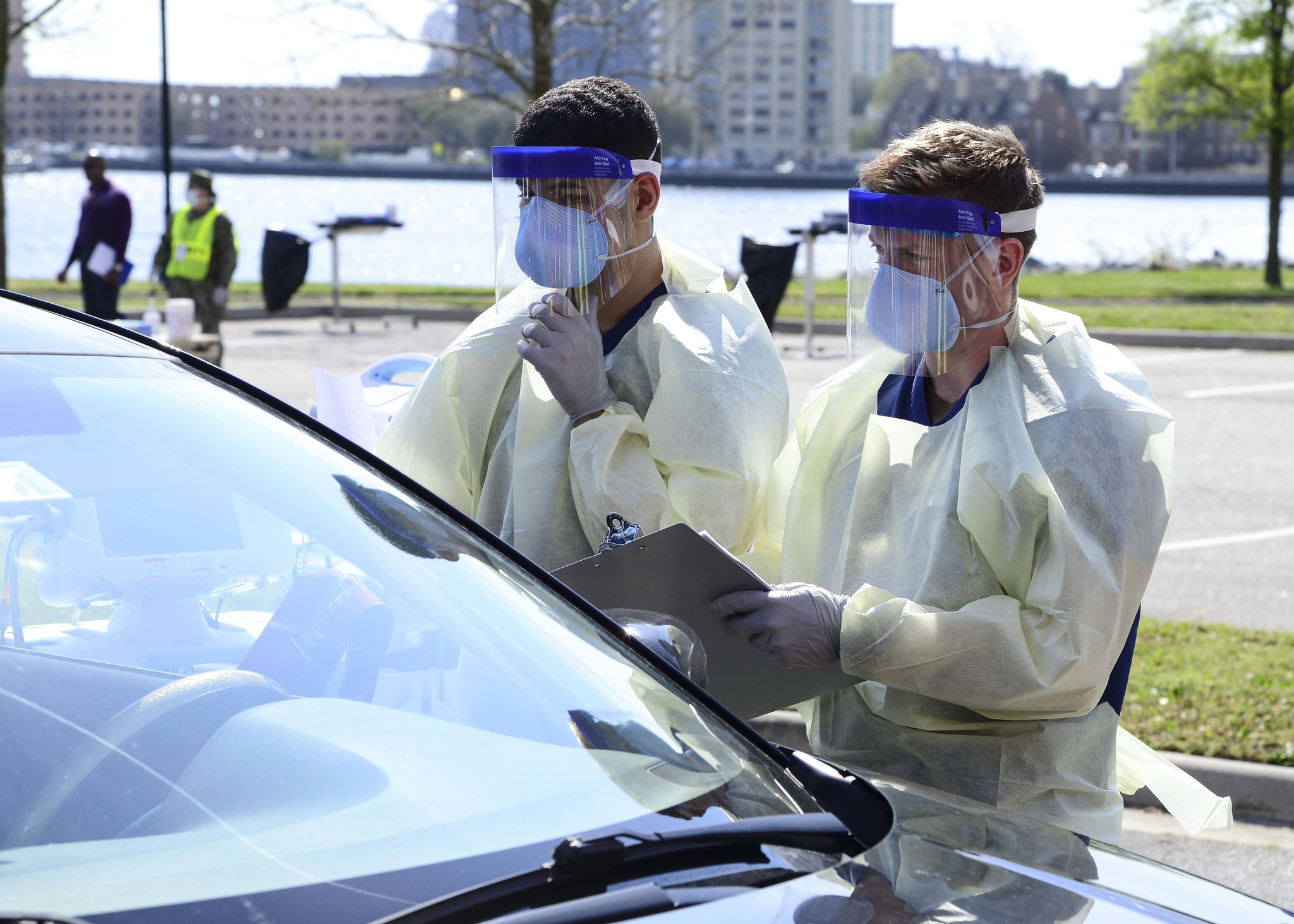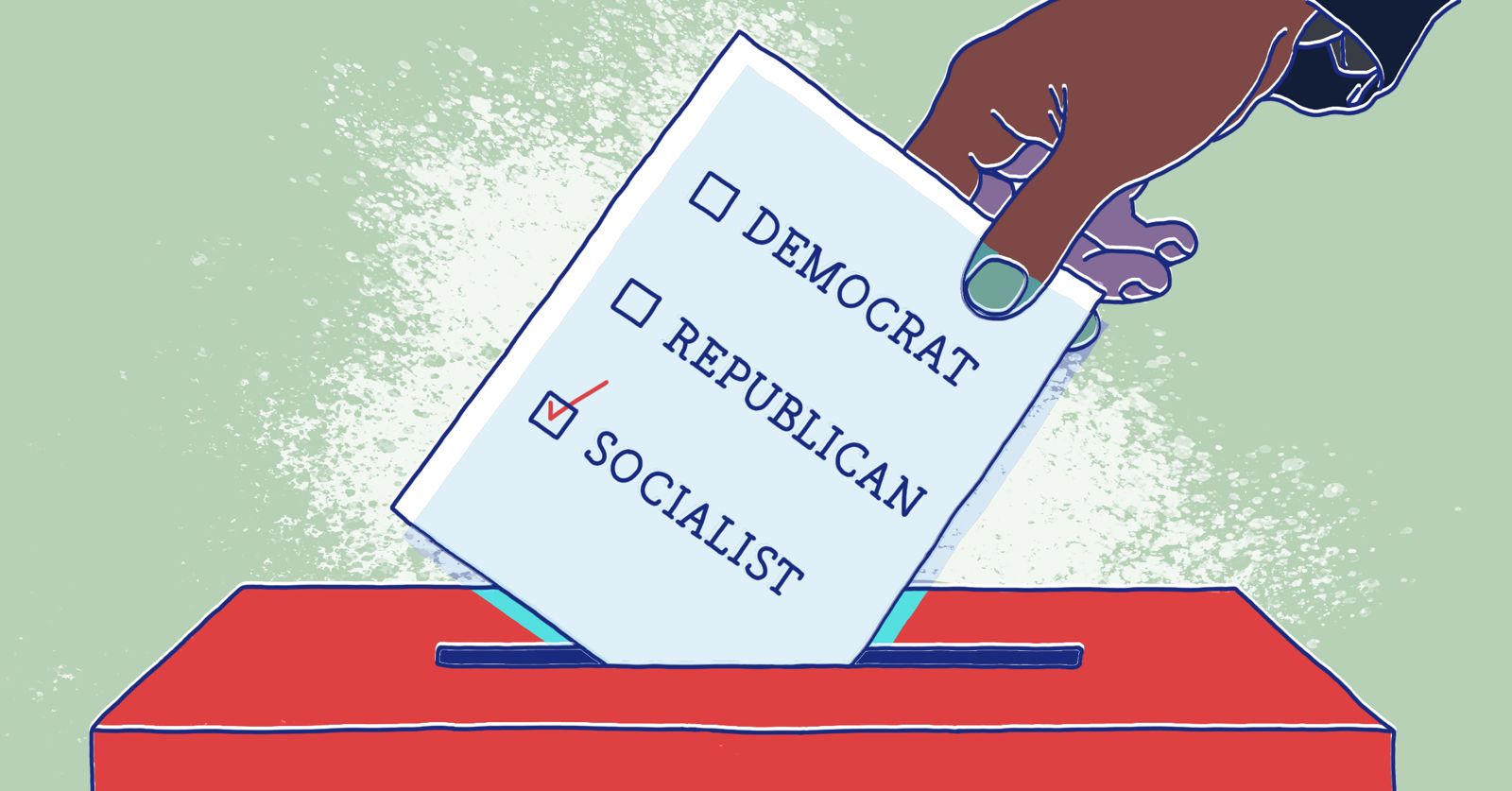Capitalism breeds crisis. Before the global Coronavirus pandemic struck, that crisis manifested in the unfolding climate catastrophe, alongside the concentration of wealth in ever-fewer hands and systemic racial oppression. It was scarcely a year ago that the demand for a Green New Deal arose as the boldest and most comprehensive demand by the multiracial working class to reverse these escalating crises. The demand was not simply for clean energy and stronger environmental policy but the creation of a new economic and political system that puts the needs of people over profit.
The pandemic has swiftly brought the preexisting crisis of neoliberal capitalism to a boiling point. It is, first and foremost, a public health emergency on a massive scale, one that decades of austerity and privatization have left us unnecessarily vulnerable to. But the health emergency brings with it an unprecedented economic crisis that has brought capital accumulation to a stand-still in entire sectors. That economic crisis, which already loomed before the pandemic, is staggering in its scope and scale. In a matter of weeks, unemployment has topped the peak it reached more than three years after the 1929 stock market crash. Among other things, global supply chains have been disrupted with impacts on domestic production, and large sectors of the domestic service economy that depend on travel, leisure and hospitality have all but ground to a halt. Secondary impacts will play out due to extraordinary levels of public and private debt and a stock market in free fall.
Finally, the pandemic portends a brewing political crisis. On one hand, the response of governments, parties, and elected officials shows itself with each passing week to be far too timid to halt the spread of the virus and restore economic “normalcy;” on the other, the state takes on the unaccustomed new role of ordering “non-essential” workers to stay home.
We must hope that the pandemic will soon peak and begin to subside, despite the bungled response of political and economic elites. Even then, however, the economic and political crises will continue for months if not years. All these indicators suggest that we could be entering a profound restructuring of the global economy on a scale comparable to the turn to neoliberalism in the mid-1970s.
What Comes Next?
The crisis opens a path that could — if we organize — lead to the displacement of major pillars of the neoliberal political economy. Indications of that path have revealed themselves in the first weeks of the pandemic, and we can already begin to hypothesize about how it might open up in the post-pandemic reconstruction of the economic and political systems.
But even as we begin to map the still-emerging contours of that path, we must acknowledge the very real possibility that entrenched forces will prevail. Instead of achieving an economic system built on socialist, or at least social democratic, pillars, we could easily find ourselves en route to a mass consolidation by the billionaire investors left standing, resulting in new concentrations of power and levels of economic inequality that will dwarf even pre-Coronavirus levels. Another possible outcome is the success of a far right-wing response that is already coalescing around the elements of xenophobia, nationalism, and military aggression.
In short, as Naomi Klein points out in a recent video, there is no certainty of winning a better world. But there are reasons to be hopeful.
Those reasons fall into three broad categories.
First, there are reasons associated with the pre-existing political and labor landscape. When the so-called Great Recession of 2008 hit, the organization, mobilization, and militancy of labor and the Left were at historically low levels. In the decade since, while still weak by historical standards, millions of Americans have experienced a political awakening. That awakening, first driven by movements such as Black Lives Matter and Occupy Wall Street, has been fueled in recent years by the 2016 primary campaign of Bernie Sanders, the election of Donald Trump, the new wave of militancy among certain sectors of workers, including a wave of major successful teachers’ strikes, and the emergence of a new wave of democratic socialist candidates like Alexandria Ocasio-Cortez. And during the Coronavirus crisis itself, worker responses are already evident, with production and warehouse workers stopping work, teachers organizing to shut down the New York City schools when elected officials failed to do so, and healthcare workers demanding safe working and healing conditions in hospitals. (The disappointing news that Sanders has suspended his 2020 primary campaign must be seen in that broader context.)
And that pre-existing political landscape include the emergence over the past year of the Green New Deal as a mass political demand and the millions of working people energized by Sanders’ 2020 primary campaign.
Second are reasons associated with the nature of the pandemic itself and how it is likely to play out in that pre-existing landscape. Marxists understand that political consciousness is fundamentally shaped by material conditions. The pandemic, as a medical, economic, and political issue, is a material condition that is dramatically affecting the lives, health, and livelihoods of hundreds of millions of Americans. Tragically, pre-existing health disparities make the pandemic far more dangerous to African Americans and other people of color who are falling sick and dying at disproportionate rates, and the impact of the economic downturn is also likely to fall disproportionately on workers of color. Yet every American will be hit, both by the pandemic itself and by the associated economic fallout. It is quite possible that, within weeks, millions who survive will be mourning the death of a loved one or healing from the trauma of a horrific illness. And everyone will be powerfully rocked by the economic consequences, whether through loss of employment (including, for millions, loss of employer-provided healthcare), steep reduction in pay through exposure to unsafe working conditions, or (for retirees and others lucky enough to have retirement accounts or own homes) through loss of asset value in the stock and real estate markets. The loss of income could lead to other tragedies, including mass evictions and foreclosures.
As these health and economic conditions seize the material lives of Americans, the political ideas of millions may rapidly evolve. For many, that will mean disillusionment with political and economic elites they previously trusted and a new openness to democratic socialist ideas and demands. It will also mean an uptick in worker capacity and sophistication for shop-floor organizing. Among other things, as workers organically wake up to the fact that their bosses value their profits over the lives of their workers, worker demands are consolidating in a way reminiscent of the class-wide demand for an eight-hour working day in the 1880s: essential workers are demanding safe working conditions and hazard pay, while most others need to be sent home to shelter in place with full pay and benefits.
A final reason to advance our struggle with some degree of confidence is that the immediate pandemic response is already trending in the direction of normalizing demands for government action that puts the rights of the working class ahead of profits and even property rights.
The Ambiguous Role of the State in this Crisis
Where is the state in all of this? Its typical role has been to secure the conditions for capital accumulation, frequently at the expense of workers and our communities. And the federal government is trying to play that usual role now, as corporate bailouts in the recent CARES Act illustrate. But there are limits to both fiscal bailouts and monetary tools in the face of conditions in which aggregate demand has fallen precipitously in multiple sectors of the economy. According to Jerome Ross in Tribune “total debt reached $253 trillion in late 2019, or the equivalent of 322% of global GDP.”
Indeed, today, at the state and local level, the usual role of the state has been overshadowed by an unaccustomed and opposite one: Through enforcing shelter-in-place orders, state sectors are literally forcing businesses deemed non-essential to the pandemic response to shut down. It is as if the state were siding — if only in a tentative, uneven, and half-hearted way — with militant workers who are fighting for their lives against bosses who care more about stemming their losses than about the death of their workforce.
An iconic example took place in the San Francisco Bay Area when local officials stared down billionaire Elon Musk who fought a losing battle to keep his 10,000-worker Tesla facility open. (One local official added, bringing to mind the demand of GE workers organizing to force the conversion of their factories to emergency production, “If you were to transition to manufacturing ventilators, or other equipment intended to aid in the fight against Covid-19,” the plant could stay open.)
Socialists organizing during the crisis must figure out how to respond to this new situation effectively.
For one thing, many of the immediate demands that are clearly needed to slow the spread of the virus are, at the same time, steps towards a more just economy. These include demands for free testing and medical care, increased hospital capacity, and social production and distribution of emergency health and medical supplies; for unemployment and disability payments for every worker who loses income or falls sick; and for strict prohibitions on price gouging, worker exploitation, and bailouts of private-sector investors.
Equally relevant are immediate demands to slow the spread of the virus. These demands include housing the homeless and imposing a moratorium on evictions and foreclosures; providing paid sick and family leave; and providing fare-free transit to protect the health of bus drivers. Workers, meanwhile, are organizing (with support from DSA) for safe working conditions where they are in essential jobs and cannot work from home, for workplace closure in the case of non-essential jobs, and for the protection of other especially vulnerable populations, including immigrants, refugees, and our incarcerated brothers and sisters. Each of these demands that is won raises working-class expectations for a society that elevates the health and welfare of working people and communities over the demands of profit and private property.
Finally, these immediate demands also include calls (such as The People’s Bailout) for Congress to use its deficit spending power to make a massive infusion of funding available to meet these and other immediate demands.
No Time to Lose Our Nerve
The Coronavirus pandemic brings in its wake an economic and political upheaval on a scale likely not seen since the Great Depression. It’s on us to fight in this moment for a real working-class response.
Labor and the Left are still historically weak and nascent, of course. Nonetheless, taken together, the pre-existing political landscape, the nature of the pandemic, and the unique, though ambiguous, role of the state in the first weeks of the pandemic open up the possibility that a mass multiracial working-class movement, now and in the aftermath of the pandemic, can prevail in shaping that new economy.
At the same time, we must take the threats very seriously, both of a new round of capital consolidation and of a powerful mobilization on the far right. These threats loom as large at this moment as they have in recent decades, and the offensives of the forces behind them could unfold rapidly. And we should never underestimate the capacity of the capitalist system to survive and adapt. Far from being the very fragile and terminally-ill system Marxists once believed it to be, capitalism has proven to be one of the most resilient and difficult to transform social systems in history.
The outcome of the present crisis, in short, is uncertain. But if active layers of the working class and the democratic Left can get organized and orient our pandemic response strategically, we can put the capitalist class on the defensive. And as Naomi Klein exhorts, “This is no time to lose our nerve.”




